- Home
- Dan Simmons
Hyperion Page 2
Hyperion Read online
Page 2
“The others await,” Het Masteen said softly and nodded toward low cushions where the Consul’s luggage lay ready to open upon his command. The Templar gazed thoughtfully at the weirwood rafters while the Consul dressed in semiformal evening wear of loose black trousers, polished ship boots, a white silk blouse which ballooned at waist and elbows, topaz collar cinch, black demi-coat complete with slashes of Hegemony crimson on the epaulets, and a soft gold tricorne. A section of curved wall became a mirror and the Consul stared at the image there: a more than middle-aged man in semiformal evening wear, sunburned skin but oddly pale under the sad eyes. The Consul frowned, nodded, and turned away.
Het Masteen gestured and the Consul followed the tall, robed figure through a dilation in the pod onto an ascending walkway which curved up and out of sight around the massive bark wall of the treeship’s trunk. The Consul paused, moved to the edge of the walkway, and took a quick step back. It was at least six hundred meters down—down being created by the one-sixth standard gravity being generated by the singularities imprisoned at the base of the tree—and there were no railings.
They resumed their silent ascent, turning off from the main trunk walkway thirty meters and half a trunk-spiral later to cross a flimsy suspension bridge to a five-meter-wide branch. They followed this outward to where the riot of leaves caught the glare of Hyperion’s sun.
“Has my ship been brought out of storage?” asked the Consul.
“It is fueled and ready in sphere 11,” said Het Masteen. They passed into the shadow of the trunk and stars became visible in the black patches between the dark latticework of leaves. “The other pilgrims have agreed to ferry down in your ship if the FORCE authorities give permission,” added the Templar.
The Consul rubbed his eyes and wished that he had been allowed more time to retrieve his wits from the cold grip of cryonic fugue. “You’ve been in touch with the task force?”
“Oh, yes, we were challenged the moment we tunneled down from quantum leap. A Hegemony warship is … escorting us … this very moment.” Het Masteen gestured toward a patch of sky above them.
The Consul squinted upward but at that second segments of the upper tiers of branches revolved out of the treeship’s shadow and acres of leaves ignited in sunset hues. Even in the still shadowed places, glowbirds nestled like Japanese lanterns above lighted walkways, glowing swingvines, and illuminated hanging bridges, while fireflies from Old Earth and radiant gossamers from Maui-Covenant blinked and coded their way through labyrinths of leaves, mixing with constellations sufficiently to fool even the most starwise traveler.
Het Masteen stepped into a basket lift hanging from a whiskered-carbon cable which disappeared into the three hundred meters of tree above them. The Consul followed and they were borne silently upward. He noted that the walkways, pods, and platforms were conspicuously empty except for a few Templars and their diminutive crew clone counterparts. The Consul could recall seeing no other passengers during his rushed hour between rendezvous and fugue, but he had put that down to the imminence of the treeship going quantum, assuming then that the passengers were safe in their fugue couches. Now, however, the treeship was traveling for below relativistic velocities and its branches should be crowded with gawking passengers. He mentioned his observation to the Templar.
“The six of you are our only passengers,” said Het Masteen. The basket stopped in a maze of foliage and the treeship captain led the way up a wooden escalator worn with age.
The Consul blinked in surprise. A Templar treeship normally carried between two and five thousand passengers; it was easily the most desirable way to travel between the stars. Treeships rarely accrued more than a four- or five-month time-debt, making short, scenic crossings where star systems were a very few light-years apart, thus allowing their affluent passengers to spend as little time as necessary in fugue. For the treeship to make the trip to Hyperion and back, accumulating six years of Web time with no paying passengers would mean a staggering financial loss to the Templars.
Then the Consul realized, belatedly, that the treeship would be ideal for the upcoming evacuation, its expenses ultimately to be reimbursed by the Hegemony. Still, the Consul knew, to bring a ship as beautiful and vulnerable as the Yggdrasill—one of only five of its kind—into a war zone was a terrible risk for the Templar Brotherhood.
“Your fellow pilgrims,” announced Het Masteen as he and the Consul emerged onto a broad platform where a small group waited at one end of a long wooden table. Above them the stars burned, rotating occasionally as the treeship changed its pitch or yaw, while to either side a solid sphere of foliage curved away like the green skin of some great fruit. The Consul immediately recognized the setting as the Captain’s dining platform, even before the five other passengers rose to let Het Masteen take his place at the head of the table. The Consul found an empty chair waiting for him to the left of the Captain.
When everyone was seated and quiet, Het Masteen made formal introductions. Although the Consul knew none of the others from personal experience, several of the names were familiar and he used his diplomat’s long training to file away identities and impressions.
To the Consul’s left sat Father Lenar Hoyt, a priest of the old-style Christian sect known as Catholic. For a second the Consul had forgotten the significance of the black clothing and Roman collar, but then he remembered St. Francis Hospital on Hebron where he had received alcohol trauma therapy after his disastrous first diplomatic assignment there almost four standard decades earlier. And at the mention of Hoyt’s name he remembered another priest, one who had disappeared on Hyperion halfway through his own tenure there.
Lenar Hoyt was a young man by the Consul’s reckoning—no more than his early thirties—but it appeared that something had aged the man terribly in the not too distant past. The Consul looked at the thin face, cheekbones pressing against sallow flesh, eyes large but hooded in deep hollows, thin lips set in a permanent twitch of muscle too downturned to be called even a cynical smile, the hairline not so much receding as ravaged by radiation, and he felt he was looking at a man who had been ill for years. Still, the Consul was surprised that behind that mask of concealed pain there remained the physical echo of the boy in the man—the faintest remnants of the round face, fair skin, and soft mouth which had belonged to a younger, healthier, less cynical Lenar Hoyt.
Next to the priest sat a man whose image had been familiar to most citizens of the Hegemony some years before. The Consul wondered if the collective attention span in the Worldweb was as short now as it had been when he had lived there. Shorter, probably. If so, then Colonel Fedmahn Kassad, the so-called Butcher of South Bressia, was probably no longer either infamous or famous. To the Consul’s generation and to all those who lived in the slow, expatriate fringe of things, Kassad was not someone one was likely to forget.
Colonel Fedmahn Kassad was tall—almost tall enough to look the two-meter Het Masteen in the eye—and dressed in FORCE black with no rank insignia or citations showing. The black uniform was oddly similar to Father Hoyt’s garb, but there was no real resemblance between the two men. In lieu of Hoyt’s wasted appearance, Kassad was brown, obviously fit, and whip-handle lean, with strands of muscle showing in shoulder, wrist, and throat. The Colonel’s eyes were small, dark, and as all-encompassing as the lenses of some primitive video camera. His face was all angles: shadows, planes, and facets. Not gaunt like Father Hoyt’s, merely carved from cold stone. A thin line of beard along his jawline served to accent the sharpness of his countenance as surely as blood on a knife blade.
The Colonel’s intense, slow movements reminded the Consul of an Earth-bred jaguar he had seen in a private seedship zoo on Lusus many years before. Kassad’s voice was soft but the Consul did not fail to notice that even the Colonel’s silences commanded attention.
Most of the long table was empty, the group clustered at one end. Across from Fedmahn Kassad sat a man introduced as the poet Martin Silenus.
Silenus appeared to be qu
ite the opposite of the military man across from him. Where Kassad was lean and tall, Martin Silenus was short and visibly out of shape. Countering Kassad’s stone-cut features, the poet’s face was as mobile and expressive as an Earth primate’s. His voice was a loud, profane rasp. There was something, thought the Consul, almost pleasantly demonic about Martin Silenus, with his ruddy cheeks, broad mouth, pitched eyebrows, sharp ears, and constantly moving hands sporting fingers long enough to serve a concert pianist. Or a strangler. The poet’s silver hair had been cropped into rough-hewn bangs.
Martin Silenus seemed to be in his late fifties, but the Consul noticed the telltale blue tinge to throat and palms and suspected that the man had been through more than a few Poulsen treatments. Silenus’s true age might be anywhere from ninety to a hundred and fifty standard years. If he were close to the latter age, the Consul knew, the odds were that the poet was quite mad.
As boisterous and animated as Martin Silenus seemed upon first encounter, so the next guest at the table exuded an immediate and equally impressive sense of intelligent reticence. Sol Weintraub looked up upon introduction and the Consul noted the short gray beard, lined forehead, and sad, luminous eyes of the well-known scholar. The Consul had heard tales of the Wandering Jew and his hopeless quest, but he was shocked to realize that the old man now held the infant in his arms—his daughter Rachel, no more than a few weeks old. The Consul looked away.
The sixth pilgrim and only woman at the table was Brawne Lamia. When introduced, the detective stared at the Consul with such intensity that he could feel the pressure of her gaze even after she looked away.
A former citizen of the 1.3-g world of Lusus, Brawne Lamia was no taller than the poet two chairs to her right, but even her loose corduroy shipsuit did not conceal the heavy layers of muscle on her compact form. Black curls reached to her shoulders, her eyebrows were two dark lines dabbed horizontally across a wide brow, and her nose was solid and sharp, intensifying the aquiline quality of her stare. Lamia’s mouth was wide and expressive to the point of being sensuous, curled slightly at the corners in a slight smile which might be cruel or merely playful. The woman’s dark eyes seemed to dare the observer to discover which was the case.
It occurred to the Consul that Brawne Lamia might well be considered beautiful.
Introductions completed, the Consul cleared his throat and turned toward the Templar. “Het Masteen, you said that there were seven pilgrims. Is M. Weintraub’s child the seventh?”
Het Masteen’s hood moved slowly from side to side. “No. Only those who make a conscious decision to seek the Shrike may be counted among the pilgrims.”
The group at the table stirred slightly. Each must know what the Consul knew; only a group comprising a prime number of pilgrims might make the Shrike Church-sponsored trip north.
“I am the seventh,” said Het Masteen, captain of the Templar treeship Yggdrasill and True Voice of the Tree. In the silence which followed the announcement, Het Masteen gestured and a group of crew clones began serving the pilgrims their last meal before planetfall.
“So the Ousters are not in-system yet?” asked Brawne Lamia. Her voice had a husky, throaty quality which strangely stirred the Consul.
“No,” said Het Masteen. “But we cannot be more than a few standard days ahead of them. Our instruments have detected fusion skirmishes within the system’s Oört cloud.”
“Will there be war?” asked Father Hoyt. His voice seemed as fatigued as his expression. When no one volunteered a response, the priest turned to his right as if retroactively directing the question to the Consul.
The Consul sighed. The crew clones had served wine; he wished it had been whiskey. “Who knows what the Ousters will do?” he said. “They no longer appear to be motivated by human logic.”
Martin Silenus laughed loudly, spilling his wine as he gestured. “As if we fucking humans were ever motivated by human logic!” He took a deep drink, wiped his mouth, and laughed again.
Brawne Lamia frowned. “If the serious fighting starts too soon,” she said, “perhaps the authorities will not allow us to land.”
“We will be allowed to pass,” said Het Masteen. Sunlight found its way past folds in his cowl to fall on yellowish skin.
“Saved from certain death in war to be delivered to certain death at the hands of the Shrike,” murmured Father Hoyt.
“There is no death in all the Universe!” intoned Martin Silenus in a voice which the Consul felt sure could have awakened someone deep in cryogenic fugue. The poet drained the last of his wine and raised the empty goblet in an apparent toast to the stars:
“No smell of death—there shall be no death, moan, moan;
Moan, Cybele, moan; for thy pernicious Babes
Have changed a god into a shaking palsy.
Moan, brethren, moan, for I have no strength left;
Weak as the reed—weak—feeble as my voice—
Oh, oh, the pain, the pain of feebleness.
Moan, moan, for still I thaw.…”
Silenus abruptly broke off and poured more wine, belching once into the silence which had followed his recitation. The other six looked at one another. The Consul noticed that Sol Weintraub was smiling slightly until the baby in his arms stirred and distracted him.
“Well,” said Father Hoyt hesitantly, as if trying to retrieve an earlier strand of thought, “if the Hegemony convoy leaves and the Ousters take Hyperion, perhaps the occupation will be bloodless and they’ll let us go about our business.”
Colonel Fedmahn Kassad laughed softly. “The Ousters don’t want to occupy Hyperion,” he said. “If they take the planet they’ll loot what they want and then do what they do best. They’ll burn the cities into charred rubble, break the rubble into smaller pieces, and then bake the pieces until they glow. They’ll melt the poles, boil the oceans, and then use the residue to salt what’s left of the continents so nothing will ever grow there again.”
“Well …” began Father Hoyt and then trailed off.
There was no conversation as the clones cleared the soup and salad dishes and brought on the main course.
“You said that there was a Hegemony warship escorting us,” the Consul said to Het Masteen as they finished their roast beef and boiled sky squid.
The Templar nodded and pointed. The Consul squinted but could make out nothing moving against the rotating starfield.
“Here,” said Fedmahn Kassad and leaned across Father Hoyt to hand the Consul a collapsible pair of military binoculars.
The Consul nodded his thanks, thumbed on the power, and scanned the patch of sky Het Masteen had indicated. Gyroscopic crystals in the binoculars hummed slightly as they stabilized the optics and swept the area in a programmed search pattern. Suddenly the image froze, blurred, expanded, and steadied.
The Consul could not avoid an involuntary intake of breath as the Hegemony ship filled the viewer. Neither the expected field-blurred seed of a solo ramscout nor the bulb of a torchship, the electronically outlined image was of a matte-black attack carrier. The thing was impressive in the way only warships through the centuries had succeeded in being. The Hegemony spinship was incongruously streamlined with its four sets of boom arms retracted in battle readiness, its sixty-meter command probe sharp as a Clovis point, and its Hawking drive and fusion blisters set far back along the launch shaft like feathers on an arrow.
The Consul handed the binoculars back to Kassad without comment. If the task force was using a full attack carrier to escort the Yggdrasill, what kind of firepower were they setting in place to meet the Ouster invasion?
“How long until we land?” asked Brawne Lamia. She had been using her comlog to access the treeship’s datasphere and obviously was frustrated with what she had found. Or had not found.
“Four hours until orbit,” murmured Het Masteen. “A few minutes more by dropship. Our consular friend has offered his private craft to ferry you down.”
“To Keats?” said Sol Weintraub. It was the first time the s
cholar had spoken since dinner had been served.
The Consul nodded. “It’s still the only spaceport on Hyperion set to handle passenger vehicles,” he said.
“Spaceport?” Father Hoyt sounded angry. “I thought that we were going straight to the north. To the Shrike’s realm.”
Het Masteen patiently shook his head. “The pilgrimage always begins from the capital,” he said. “It will take several days to reach the Time Tombs.”
“Several days,” snapped Brawne Lamia. “That’s absurd.”
“Perhaps,” agreed Het Masteen, “but it is the case, nonetheless.”
Father Hoyt looked as if something in the meal had caused him indigestion even though he had eaten almost nothing. “Look,” he said, “couldn’t we change the rules this once—I mean, given the war scare and all? And just land near the Time Tombs or wherever and get it over with?”
The Consul shook his head. “Spacecraft and aircraft have been trying to take the short route to the northern moors for almost four hundred years,” he said. “I know of none who made it.”
“May one inquire,” said Martin Silenus, happily raising his hand like a schoolboy, “just what the gibbering fuck happens to these legions of ships?”
Father Hoyt frowned at the poet. Fedmahn Kassad smiled slightly.
Sol Weintraub said, “The Consul did not mean to suggest that the area is inaccessible. One may travel by ship or various land routes. Nor do spacecraft and aircraft disappear. They easily land near the ruins or the Time Tombs and just as easily return to whatever point their computers command. It is merely the pilots and passengers who are never seen again.” Weintraub lifted the sleeping baby from his lap and set her in an infant carrier slung around his neck.

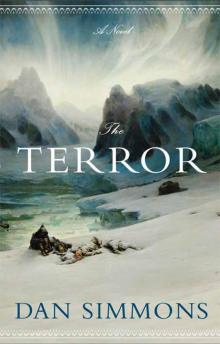 The Terror
The Terror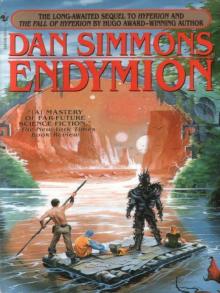 Endymion
Endymion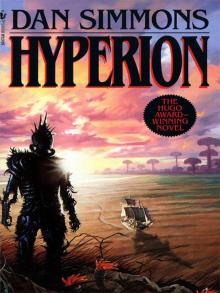 Hyperion
Hyperion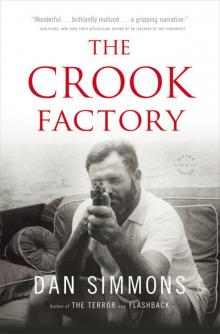 The Crook Factory
The Crook Factory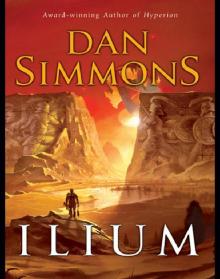 Ilium
Ilium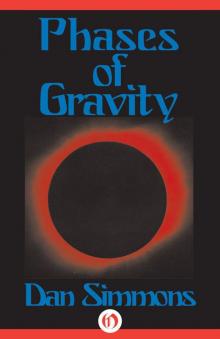 Phases of Gravity
Phases of Gravity Hardcase
Hardcase Fires of Eden
Fires of Eden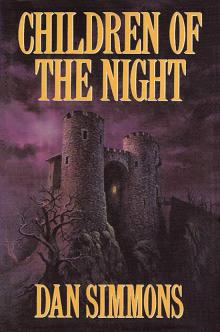 Children of the Night
Children of the Night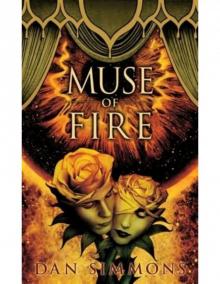 Muse of Fire
Muse of Fire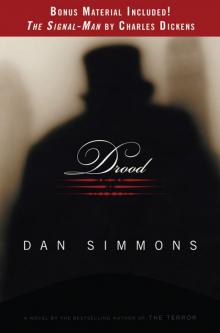 Drood
Drood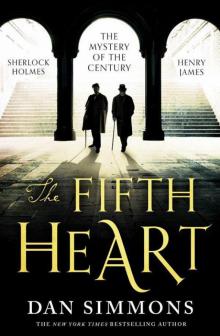 The Fifth Heart
The Fifth Heart Carrion Comfort
Carrion Comfort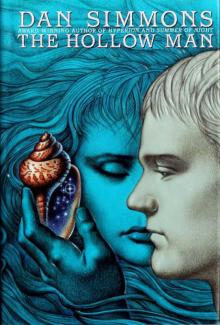 The Hollow Man
The Hollow Man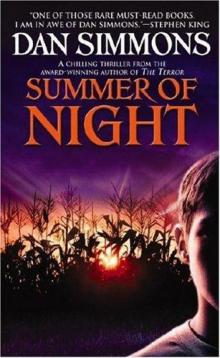 Summer of Night
Summer of Night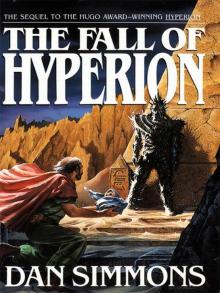 The Fall of Hyperion
The Fall of Hyperion Black Hills
Black Hills A Winter Haunting
A Winter Haunting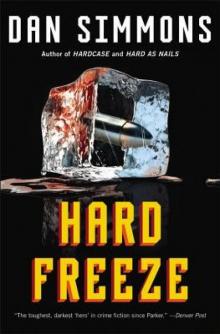 Hard Freeze
Hard Freeze Prayers to Broken Stones
Prayers to Broken Stones Hard as Nails
Hard as Nails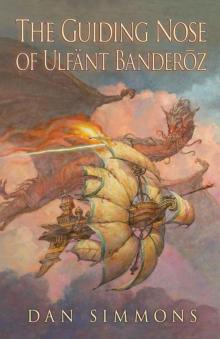 The Guiding Nose of Ulfant Banderoz
The Guiding Nose of Ulfant Banderoz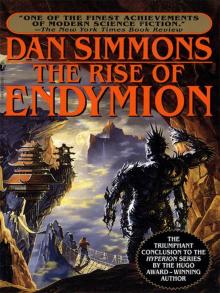 The Rise of Endymion
The Rise of Endymion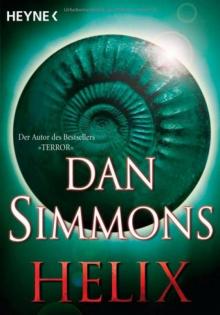 Orphans of the Helix
Orphans of the Helix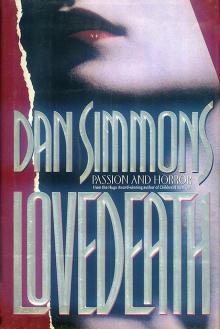 Lovedeath
Lovedeath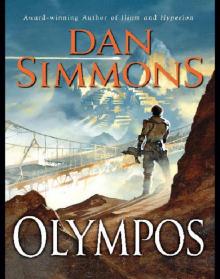 Olympos
Olympos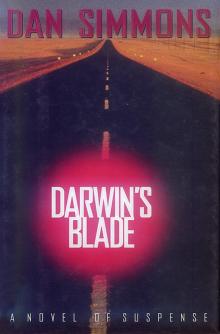 Darwin's Blade
Darwin's Blade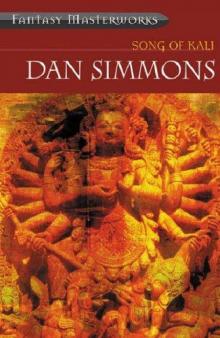 Song of Kali
Song of Kali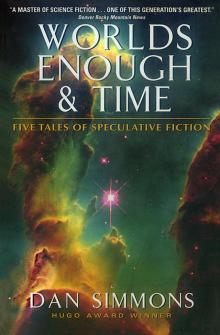 Worlds Enough & Time: Five Tales of Speculative Fiction
Worlds Enough & Time: Five Tales of Speculative Fiction The Abominable
The Abominable The Death of the Centaur
The Death of the Centaur Hard as Nails jk-3
Hard as Nails jk-3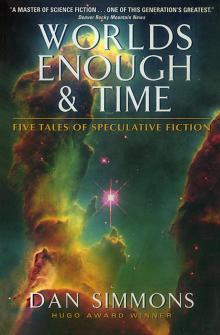 Worlds Enough & Time
Worlds Enough & Time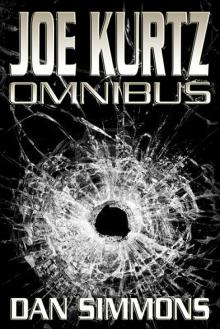 Joe Kurtz Omnibus
Joe Kurtz Omnibus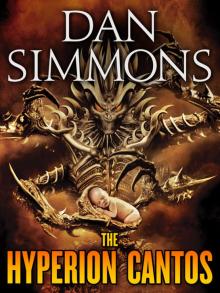 The Hyperion Cantos 4-Book Bundle
The Hyperion Cantos 4-Book Bundle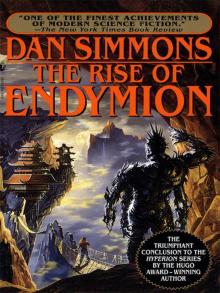 Rise of Endymion
Rise of Endymion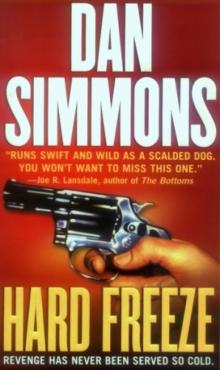 Hard Freeze jk-2
Hard Freeze jk-2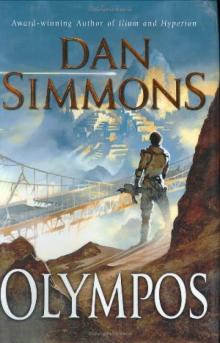 Olympos t-2
Olympos t-2 The Abominable: A Novel
The Abominable: A Novel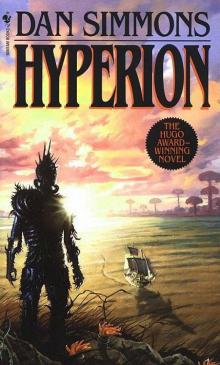 Hyperion h-1
Hyperion h-1 Remembering Siri
Remembering Siri Black Hills: A Novel
Black Hills: A Novel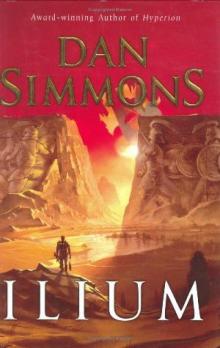 Ilium t-1
Ilium t-1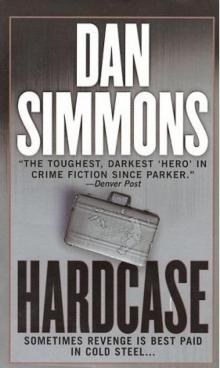 Hardcase jk-1
Hardcase jk-1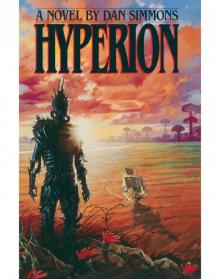 Hyperion 01 - Hyperion
Hyperion 01 - Hyperion